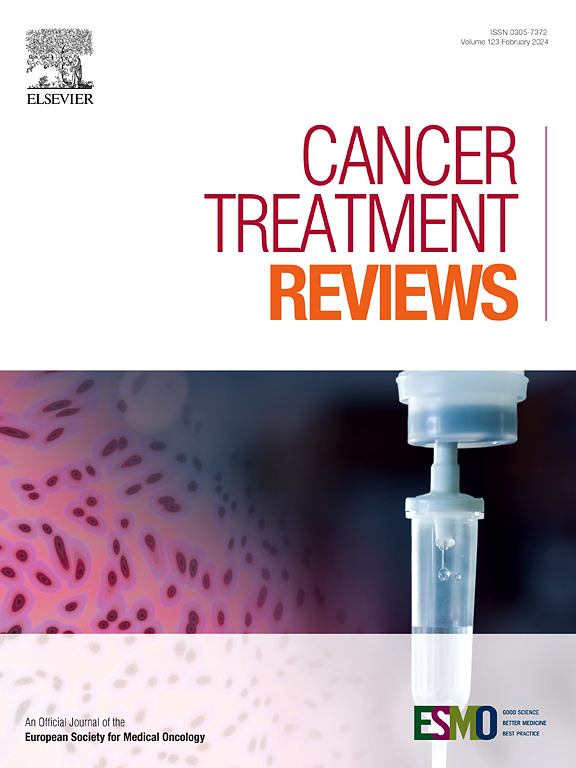Optimizing outcomes and personalizing care with targeted agents in advanced cholangiocarcinoma
IF 9.6
1区 医学
Q1 ONCOLOGY
引用次数: 0
Abstract
Traditional chemotherapy and immunotherapy-based systemic treatments for locally advanced or metastatic cholangiocarcinoma have been associated with poor clinical outcomes driven partly by molecular heterogeneity promoting early treatment resistance and a higher toxicity profile associated with these regimens. Few patients are eligible for upfront surgical resection and clinical studies have been traditionally difficult to conduct due to the orphan nature of this disease. However, increasing use of genomic profiling in clinical practice have led to active investigations of aberrant albeit promising mechanistic therapeutic targets such as IDH-1, FGFRs, BRAFV600E, HER-2 and NTRK.
This review article aims to highlight the complex genomic landscape of this difficult-to-treat disease, followed by a discussion of evidence-based biological mechanisms that can be actioned using targeted agents. We explore the clinical rationale behind a targeted therapeutic strategy, the role of liquid biopsies in guiding clinical decisions and future treatment pathways for cholangiocarcinoma management. We also discuss the challenges and opportunities originating from recent clinical trials evaluating targeted treatments and our own institutional experience at UCLH that have aimed to address some of these biological complexities and have translated into improved patient outcomes via effective molecularly driven patient selection strategies. We also provide perspectives on emerging novel, next generation targeted inhibitors overcoming treatment resistance to previous targeted agents with demonstrated clinical value in a challenging patient population.
在晚期胆管癌中使用靶向药物优化疗效和个性化治疗。
对于局部晚期或转移性胆管癌,传统的化疗和免疫治疗为主的全身治疗方法临床疗效不佳,部分原因是分子异质性导致早期耐药,以及这些治疗方案的毒性较高。符合前期手术切除条件的患者很少,而且由于这种疾病的孤儿性质,临床研究历来难以开展。然而,临床实践中越来越多地使用基因组剖析技术,这促使人们积极研究异常但有希望的机理治疗靶点,如 IDH-1、FGFR、BRAFV600E、HER-2 和 NTRK。这篇综述文章旨在强调这种难治疾病复杂的基因组状况,然后讨论可使用靶向药物的循证生物机制。我们探讨了靶向治疗策略背后的临床原理、液体活检在指导临床决策中的作用以及胆管癌治疗的未来治疗途径。我们还讨论了近期评估靶向治疗的临床试验所带来的挑战和机遇,以及我们自己在 UCLH 的机构经验,这些经验旨在解决其中一些复杂的生物学问题,并通过有效的分子驱动患者选择策略改善患者预后。我们还对新出现的下一代靶向抑制剂进行了展望,这些抑制剂克服了以往靶向药物的耐药性,并在具有挑战性的患者群体中证明了其临床价值。
本文章由计算机程序翻译,如有差异,请以英文原文为准。
求助全文
约1分钟内获得全文
求助全文
来源期刊

Cancer treatment reviews
医学-肿瘤学
CiteScore
21.40
自引率
0.80%
发文量
109
审稿时长
13 days
期刊介绍:
Cancer Treatment Reviews
Journal Overview:
International journal focused on developments in cancer treatment research
Publishes state-of-the-art, authoritative reviews to keep clinicians and researchers informed
Regular Sections in Each Issue:
Comments on Controversy
Tumor Reviews
Anti-tumor Treatments
New Drugs
Complications of Treatment
General and Supportive Care
Laboratory/Clinic Interface
Submission and Editorial System:
Online submission and editorial system for Cancer Treatment Reviews
 求助内容:
求助内容: 应助结果提醒方式:
应助结果提醒方式:


